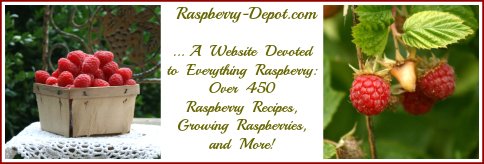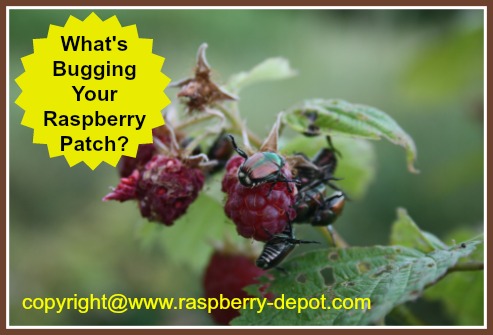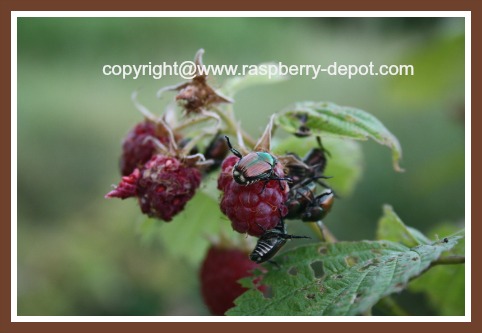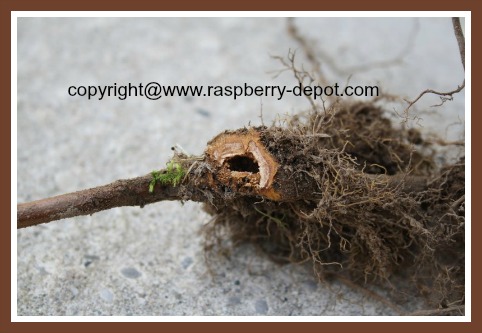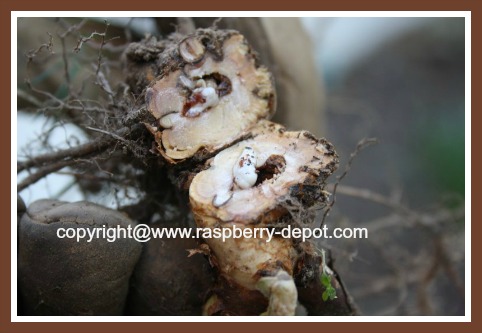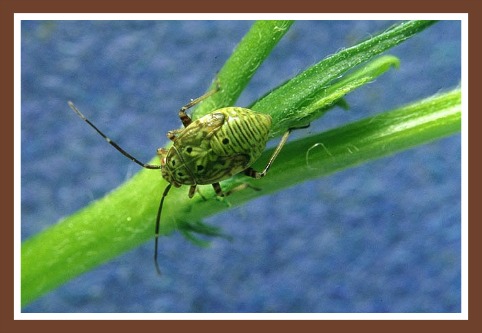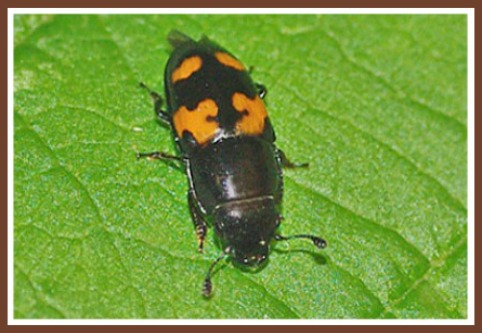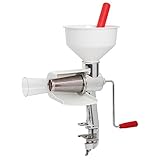Raspberry Plant Pests
Identifying Raspberry Pest and Insect
Problems for the Home Gardener
Are you having problems with Raspberry Plant Pests that are affecting the raspberry leaves, fruit, canes, or roots?
*FTC Disclosure: As an Amazon Associate I earn from qualifying purchases with no extra cost to you
*FTC Disclosure: As an Amazon Associate I earn from qualifying
purchases with no extra cost to you
Maintaining good management practices when growing raspberry plants will obviously help to reduce the problem of raspberry pests and insects from attacking the leaves, canes, the plant roots and the fruit.
Healthy raspberry plants will also recover more quickly from an insect attack.
Here follow several tips to remember when growing raspberries to help the plants stay healthy and resistant to pests.
Be sure to pick mature raspberries as they ripen.
Even if the raspberries are not needed, or they are imperfect or severely damaged, remove them from the plant.
Decaying or overripe fruit will only serve to attract insect pests to the raspberry patch.
When pests and disease are noticed, immediate action should be taken to avoid endangering the entire harvest of raspberries.
This section deals with Raspberry Pests, be sure to check the section dealing with Raspberry Diseases as there is over-lap between these two categories.
GO to Common Raspberry Diseases
If it's Birds that are eating your raspberry harvest,
Eradicate all wild brambles and any other wild host plants that may be growing nearby to help prevent the spread of pests.
In the spring, inspect the raspberry plants, and prune out portions of raspberry canes that have swelling, scars, or cracks, and burn the removed canes.
It is very important to observe the interval between insecticide application and when you can harvest the fruit, so always read the pesticide label carefully.
Common Raspberry Pests
Japanese Beetle - Japanese Beetles feed on both the raspberry fruit and the plant leaves, and they usually feed in groups, resulting in severely damaged fruit and foliage.
When these beetles infest a raspberry patch, they can make harvesting the raspberries a very unpleasant task!
In my experience with growing raspberries the Japanese Beetle is one of the most devastating pests.
GO to How to Get Rid of Japanese Beetles
Adult Japanese Beetles are about 1/2" long with metallic green bodies with copper-brown wing covers. Adults emerge from the ground and begin feeding on plants in June. These beetles live about 30 - 45 days. They are most active on warm, sunny days, preferring plants that are in direct sunlight.
The above image shows how the Japanese Beetles are devouring the raspberry fruit and the leaves of the plant.
Raspberry Cane Borer - The Cane Borer causes the tips of the young stems to wilt and eventually dry up.
This insect pest is a thin, dark coloured beetle, about 1/2 inch in length, with antennae as long as its body. The Larvae of the Cane borer are white and cylindrical.
The adult female Cane Borers chew two zipper-like rings around the tips of raspberry primocanes (first season growth stems) and lay an egg between the punctures. The tip of the young stem then wilts above the point of injury and eventually dries up. The larvae tunnel downward within the cane and overwinter within the cane, killing it.
To control, remove the wilted cane tips about 5 inches below the punctured area. Burn the clippings to destroy the insects inside.
Red-Neck Cane Borer - This insect pest causes the stem of the raspberry plants to swell up to 1 1/2 inches in diameter, several inches along the cane. By late autumn, the swellings contain 1/2 inch, creamy white-coloured grubs.
The adult Red-Neck Borer is a bluish-black beetle only 1/4 inch in length, with a distinctive coppery-red colour "neck". This beetle appears on the canes in late May or June and lays its eggs in the cane bark and the larvae bore beneath the bark, causing the swelling damage.
To control, in the Fall and Winter cut out and burn all the canes which have the distinctive abnormal swelling. If the pest problem continues, apply a pre-bloom insecticide to the canes. Check with your garden center for the appropriate insecticide or natural alternative.
Raspberry Crown Borer - This pest causes the leaves of the raspberry plants to turn red prematurely and causes the cane to wilt in late summer.
The Crown Borer is about 1 inch long, with a white body and brown head. It feeds in the larger roots (crown) or at the base of the raspberry canes.
The adult Borer is a moth that looks like a yellow jacket wasp and appears in late summer or early autumn. The adult lays eggs on the leaves, and the larvae crawl to the crown/roots of the plant/cane.
These insects overwinter under the bark just below the ground level. In the Spring, the larvae attack new cane buds and finally move downward toward the crown. It takes 2 years for the larvae to develop completely.
To control, dig and remove infested plants completely when possible and eradicate all wild brambles nearby. The insecticides for use against this pest is often not available for the home gardener, but check with your local garden center.
The above image show how the Crown Borer has bored a hole into the crown of the raspberry plant.
The image above shows the white Crown Borer larvae inside the crown/root at the base of the raspberry cane.
Tarnished Plant Bug - The sucking of this pest results in deformed raspberries. Dried up druplets may be an indication that the Tarnished Plant Bug is the pest.
To control this raspberry plant pest, keep the raspberry patch and the surrounding area as free of weeds as possible.
The above image is a Tarnished Plant Bug.
Raspberry Fruit Worm - The feeding of this pest causes elongated long holes in the leaves of the raspberry plant, which sometimes destroys bud clusters. The leaves will appear ragged and torn looking.
The Raspberry Fruit Worm adult is a small, 1/8 inch, light brown beetle covered with short hairs. The larvae are slender, creamy white, approximately 1/4 inch long and found inside the hollow part of the fruit.
Adults insects are active in May and June as raspberry buds emerge. They begin feeding on buds and tender leaves, and later on blossoms. Larvae are present in developing fruit and are most often observed at harvest.
Watch for leaf feeding around developing fruit buds. Adult Fruit Worms can be detected by shaking bud clusters into a dish or tray but quiet observation is the best way to detect these insects.
To control, application of a prebloom insecticide is recommended. It is also recommended to cultivate around the plants to help destroy pupae.
Sap / Picnic Beetle - The Sap or Picnic Beetle is a nuisance in raspberry patches as they feed on damaged, overripe, or decomposing fruit.
The Sap Beetle is about 1/4 inch long, black with cream markings. There are many different species of Sap Beetles.
These insects overwinter as adults. They emerge in the Spring and lay eggs near fermenting and decaying plant material. Larvae feed for about three weeks and then pupate, emerging as adults in late June or July. They take about 35 days to develop from egg to adult, with one generation each year.
To control, keep the garden free of overripe fruit (and vegetables). Remove any damaged, diseased and overripe fruits on a regular basis.
Baits (outside the garden area) may be used to trap beetles. Apple cider vinegar or a mixture of yeast, sugar and water combined with a few drops of liquid detergent will drown the beetles. Be sure to discard trap contents frequently and rebait the traps.
Commercially prepared bait that contains the insecticide carbaryl or bifenthrin may be helpful. It is very important to observe the interval between insecticide application and when you can harvest the fruit, so always read the pesticide label.
The above image is a Sap Beetle.
For Additional Information about raspberry pest problems, See Also:
Ontario Ministry of Agriculture and Food
University of Maine - Home and Garden
For more detailed information about growing raspberry plants, here below, (or use the navigation bars) are links to pages which will be helpful in your berry growing endeavours!
TRANSPLANTING Raspberries
(Propagating/Dividing)
Raspberry Plant CARE
(Fertilizing/Watering/Spraying/Sun Requirements)
TOP of Raspberry Plant Pests Information
HOME to Raspberry-Depot.com Homepage
©2010-2025 Raspberry-depot.com - All Rights Reserved Worldwide
No Reproduction Permitted Without
the Express Written Consent of the Site Owner
Special Occasion Recipes
♥ Valentine Recipes ♥
Pancake Day Recipes
Easter Recipes
Mother's Day Recipes
Father's Day Recipes
Thanksgiving Recipes
Christmas Recipes
New Year's Eve Recipes

This Knife Sharpener
is one of the
Most USEFUL
Kitchen
Tools
that I have
EVER
Purchased
I've been using
the same
Knife Sharpener as
the One Below for
Well Over 10 Years!
⇩
